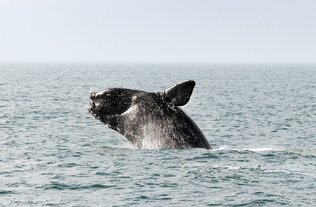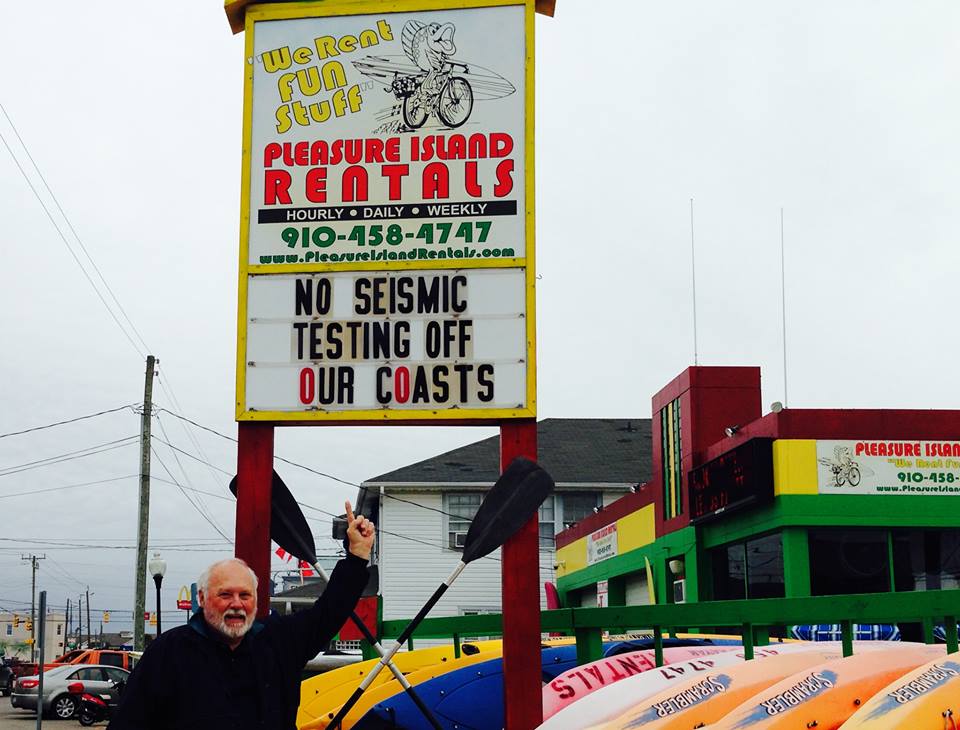http://www.miamiherald.com/2014/02/27/3963572/feds-support-air-gun-blasts-to.html
A study of what the controversial seismic tests would do to whales, dolphins and fish is on track for release at the end of February, an Interior Department official told lawmakers on Friday. Pictured is a North Atlantic right whale (Eubalaena glacialis). GEORGIA DEPARTMENT OF NATURAL RESOURCES / NOAA/MCT
BY SEAN COCKERHAM
MCCLATCHY WASHINGTON BUREAU
WASHINGTON — The Interior Department is endorsing seismic exploration for oil and gas in Atlantic waters, a crucial move toward starting drilling off the Carolinas, Virginia and possibly down to Florida.
The department released its final review Thursday, favoring a plan to allow the intense underwater seismic air gun blasts that environmentalists and some members of Congress say threatens the survival of whales and dolphins.
The oil industry wants to use the air guns to find out how much oil and gas lies along the U.S. Atlantic seabed. Federal estimates of a relatively modest 3.3 billion barrels of oil date from the 1970s and 1980s and are considered too low.
“The currently available seismic information from this area is decades old and was developed using technologies that are obsolete,” said Tommy Beaudreau, the director of the Bureau of Ocean Energy Management.
The federal government wants to use the information to decide whether to open up the mid- and south Atlantic to oil and gas drilling for the first time in decades. President Barack Obama had planned to start allowing drilling at least off the coast of Virginia, but he postponed consideration of the idea after the massive 2010 BP oil spill in the Gulf of Mexico.
The Interior Department’s plan is to start allowing underwater seismic air gun tests in an area from Delaware to Florida’s Cape Canaveral, though most of the push for offshore drilling involves the waters off the Carolinas and Virginia.
The seismic tests involve vessels towing an array of air guns that blast compressed air underwater, sending intense sound waves to the bottom of the ocean. The booms are repeated every 10 seconds or so for days or weeks.
The echoes are used to map the locations of subsea oil and gas deposits.
The Interior Department received more than 55,000 public comments on the proposal. Environmental groups warn that the blasts make whales and dolphins deaf, preventing them from feeding, mating and communicating. More than 50 members of Congress, including a few Republicans, have sent letters to the president opposing the seismic air gun tests and saying that up to 138,500 marine mammals could be injured by them.
Interior Department officials said their plan protected the endangered North Atlantic right whale by closing areas along the whales’ main migratory route to the air gun testing. Beaudreau said the tests would be monitored closely.
“We’re really going to require and demand a high level of environmental performance,” he said.
The environmental group Oceana said the protected area was too small and the endangered whales would suffer from the “dynamite-like blasts.”
“They are like the American bison of the ocean. They deserve protection. There are only 500 of them left,” said Matthew Huelsenbeck, a marine scientist for Oceana.
Oceana last week spearheaded a letter from more than 100 marine scientists and conservation biologists that urges the Obama administration not to approve the seismic tests until the National Marine Fisheries Services releases upcoming new acoustic guidelines for marine mammals.
Interior Secretary Sally Jewell is expected to give the final approval to the seismic testing plan in April. At that point the government would start reviewing the nine applications from companies that want to conduct the testing and decide whether their specific proposals should go forward.
House Natural Resources Committee Chairman Doc Hastings, R-Wash.,, said the seismic testing plan was a major milestone for efforts to open the Atlantic to oil and gas drilling.
“While it has taken far too long, this step today will help put America on a path to open new areas to more American energy production,” Hastings said.
The Obama administration is weighing whether to include mid- and south Atlantic oil and gas drilling in the next federal offshore leasing plan, which runs from 2017 through 2022.
The National Ocean Industries Association, a group that’s lobbying for offshore drilling,
said the Interior Department’s approval of seismic testing appeared to be a huge step. But the group said it needed to review the plan to make sure its restrictions didn’t make testing unworkable.
The industry group said seismic testing had been used for decades in the Gulf of Mexico and elsewhere in the world to make informed decisions about where to drill for oil.
There’s been controversy along the Gulf of Mexico, though, where the industry, environmental groups and government agencies settled a lawsuit last summer by putting some areas off limits to air gun testing for 30 months while environmental studies are conducted.
Email: scockerham@mcclatchydc.com; Twitter: @seancockerham
Read more here: http://www.miamiherald.com/2014/02/27/3963572/feds-support-air-gun-blasts-to.html#storylink=cpy
Special thanks to Richard Charter

